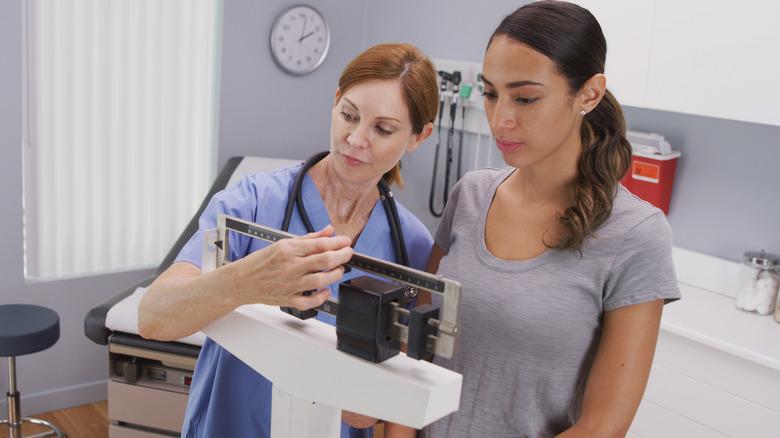The Real Reason Doctors Measure And Weigh You
We all know that a doctor's visit can be a pain. Your last annual checkup may have been lurking on your calendar for months, and the day finally arrived. You may have taken time off work, sat in rush hour traffic, or worse, sat in the waiting room until your stomach started to scream in pains of hunger. Whatever hurdle you had to overcome, good for you for taking the time to look after your health. An annual checkup doesn't have to be invasive, and it helps to be as prepared as possible to calm your nerves.
According to WebMD, an annual physical includes standard protocol in which your doctor may examine your chest to listen to your breathing, shine a light into your eyes to check your pupils, and take your blood pressure, to name a few. These are all very routine white coat procedures we all know well. But why do they need to measure and weigh us?
Getting weighed can feel like the worst part
During your annual checkup, you may be asked to step on the scale while your doctor wraps a measuring tape around different parts of your body. For many, seeing these numbers may be the most eye-opening part of their visit. For others, they may wonder if it's necessary at all. "Weight plays a role in certain things, but it doesn't paint a whole picture of health by any stretch of the imagination," Dr. Michael Lief, a primary care internist, told Refinery29.
If being weighed is the worst part of your annual checkup, know that you are not alone. Dr. Deborah Ottenheimer, OB-GYN, also told Refinery29, "Some people walk up to the scale saying, 'Oh my god, this is going to be the worst part.' And I'm like, 'Really? 'Cause if it really is, then let's not do that." Many people don't know they have a choice when it comes to getting weighed, and their doctor likely won't force them. However, it can be a valuable piece of information when discussing your health status and risks.
Estimating your BMI
WebMD states that your doctor will likely want to measure your height and waist, weigh you, and note any weight changes from your previous visit. Much of this information offers insights into a person's body mass index (BMI), which estimates body fat percentage. Getting weighed and measured to determine your BMI may be worth the initial discomfort. If your BMI is too high, you could be at an increased risk for severe conditions like heart disease, type-2 diabetes, and other serious health concerns.
Your annual checkup is a chance for you to be open with your doctor about the state of your health and any concerns you may have. "Hopefully, if you get to know your doctor over time, you develop that trust," Dr. Michael Lief told Refinery29. However, it ultimately comes down to you, and it's your choice, whether or not you step up onto the scale.



